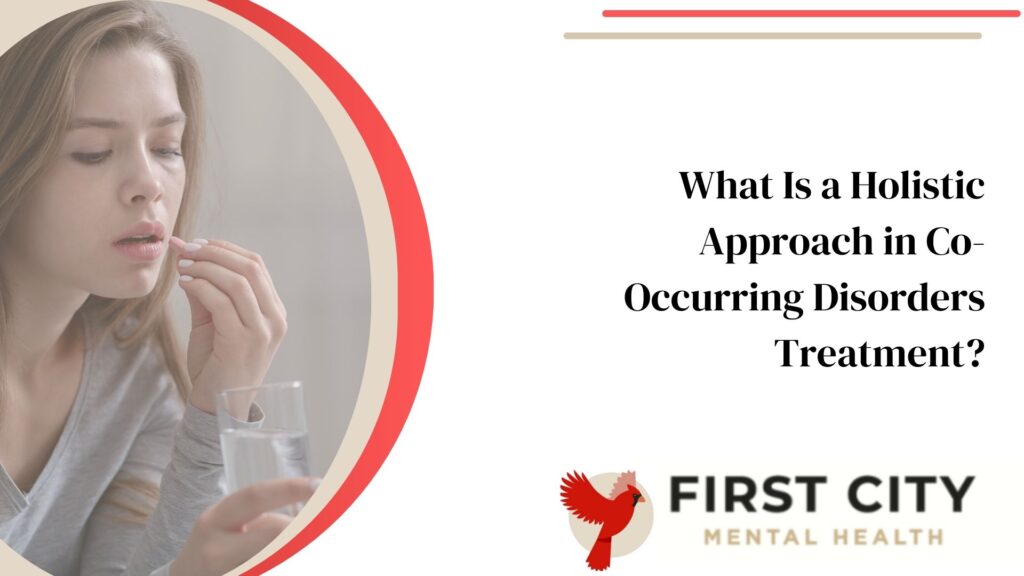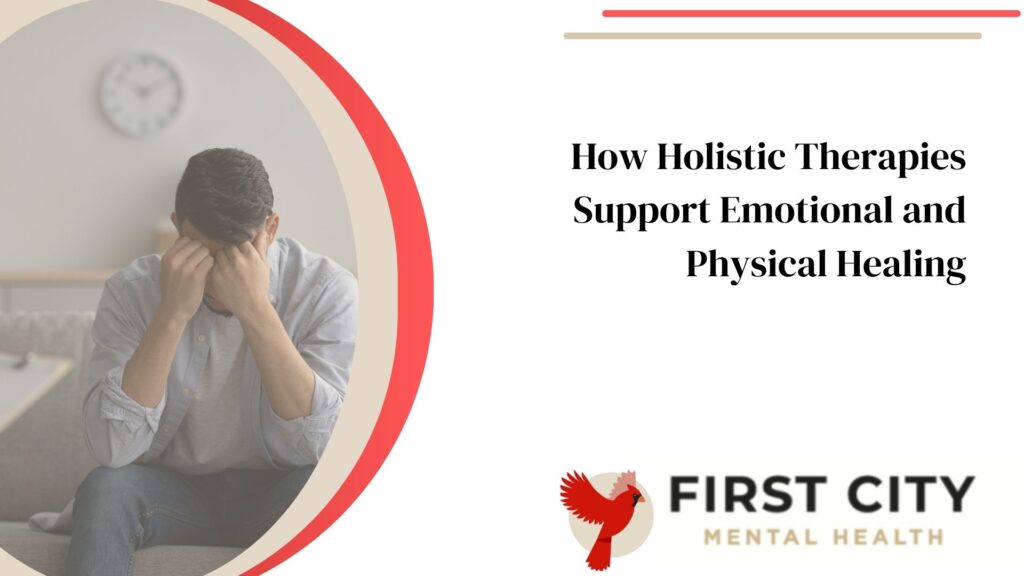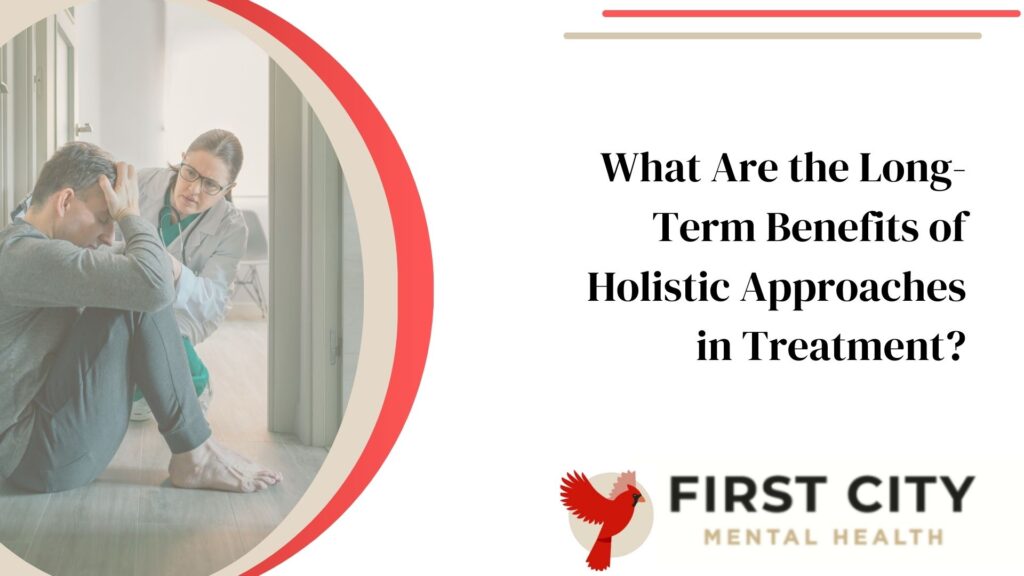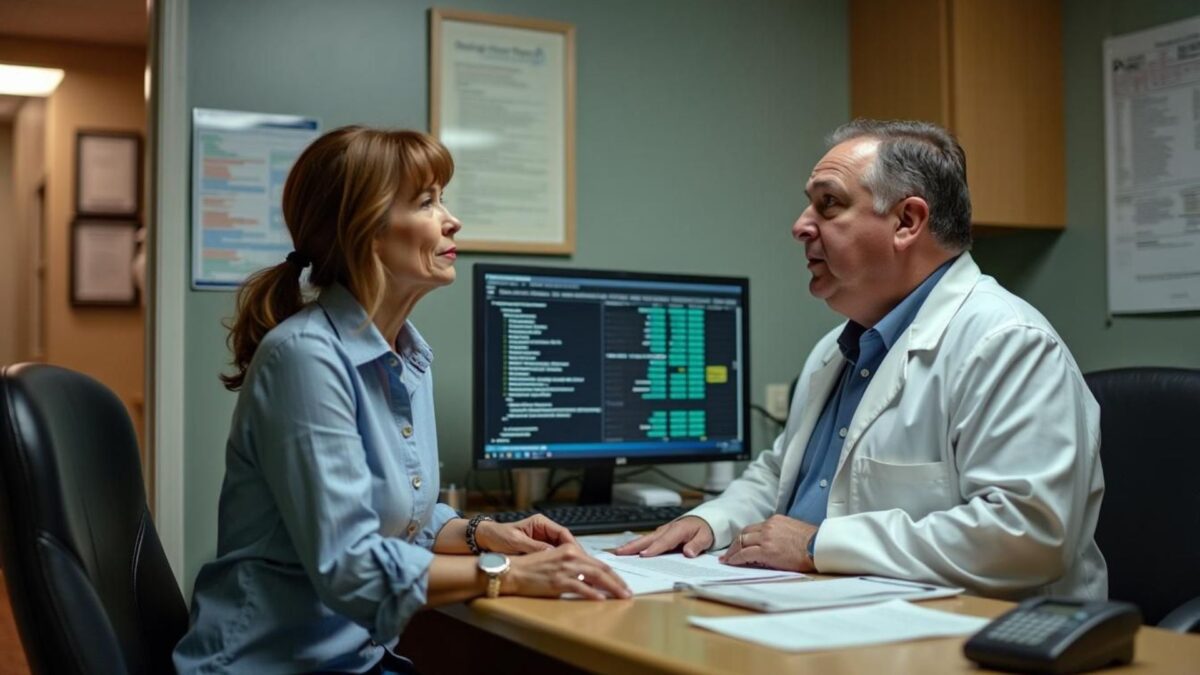
How Recovery Centers Are Essential for Co-Occurring Disorders Treatment?
July 22, 2025
How Do Anxiety Disorder Treatment Facilities Support Long-Term Recovery?
July 25, 2025Nearly 7.9 million Americans face co-occurring mental disorders, battling both mental health and substance use issues simultaneously. This staggering statistic underscores the urgent need for effective treatments that address the complexity of these intertwined challenges. Holistic approaches emerge as key in navigating the intricacies of co-occurring disorders treatment, offering a beacon of hope for those caught in this dual struggle. By integrating multiple facets of care, these comprehensive strategies ensure no stone is left unturned, paving the way for healing and recovery on all fronts.
Key Takeaways
- Holistic approaches in co-occurring disorders treatment focus on healing both the mind and body, emphasizing the interconnectedness of mental health and substance use issues.
- Incorporating holistic therapies, such as meditation, mindfulness, and physical activities, can significantly support emotional and physical recovery, offering a more comprehensive co-occurring disorders treatment plan.
- Introducing holistic methods early in the treatment process can enhance overall effectiveness, helping individuals develop coping strategies that address both the symptoms and root causes of their conditions.
- Effective holistic co-occurring disorders treatment often include nutrition and exercise plans tailored to the individual’s needs, highlighting the role of physical health in mental well-being.
Understanding Co-Occurring Disorders
Co-occurring disorders, also known as dual diagnosis, refer to the simultaneous presence of a substance use disorder and another psychiatric illness in an individual. This complex interplay of conditions can include combinations such as major depression, anxiety disorders, and personality disorders alongside substance abuse. The symptoms of these co-occurring disorders often interact, influencing the course and prognosis of both conditions. Recognizing and understanding the dual nature of these disorders is crucial for effective treatment, as addressing only one aspect can leave the other untreated, leading to incomplete recovery.
What Is a Holistic Approach in Co-Occurring Disorders Treatment?

A holistic approach to co-occurring disorders treatment goes beyond traditional methods. It integrates physical, psychological, and social aspects of care. This method recognizes that each individual’s needs are unique. Therefore, it tailors treatment plans accordingly. Additionally, it considers environmental factors that may influence the development and progression of these disorders.
Holistic therapies might include nutrition counseling, exercise programs, and mindfulness practices. These complement more conventional treatments like medication and psychotherapy. The goal is to treat the whole person, not just the symptoms. Kokomo, Indiana, for instance, offers programs that exemplify this comprehensive care model.
One key benefit of a holistic approach is its capacity to address underlying issues that contribute to co-occurring disorders. Stress, for example, can exacerbate mental health problems and substance abuse. By teaching stress management techniques, holistic treatment can provide lasting benefits.
Evidence suggests that patients who receive holistic care often report higher satisfaction levels. They feel their treatment addresses more than just the clinical aspects of their conditions. This satisfaction can lead to greater engagement with treatment and better outcomes over time.
Holistic approach in co-occurring disorders treatment Kokomo, Indiana represents a shift towards more personalized and comprehensive care. It acknowledges the complex interplay between mind, body, and environment in healing. Programs in Kokomo, Indiana, and similar places are leading the way in implementing these innovative treatments. They offer hope to those seeking recovery from co-occurring disorders by addressing all facets of their well-being.
Why Holistic Care Addresses Both Mental Health and Substance Use Disorder
Holistic care is essential in co occurring disorders treatment because it acknowledges the intricate link between mental health and substance use. It doesn’t just focus on one aspect of the individual’s condition but considers the full spectrum of their needs. This approach ensures that treatment is comprehensive, addressing both mental health issues and substance abuse simultaneously.
Patients with co-occurring disorders often find that their substance use and mental health issues are deeply intertwined. For example, someone might use drugs or alcohol as a way to self-medicate for depression or anxiety. Conversely, substance abuse can exacerbate or trigger mental health problems. Many individuals with a substance use disorder (SUD) also experience a co-occurring mental disorder, such as anxiety, depression, or bipolar disorder. Therefore, tackling only one issue is unlikely to be effective. Holistic care comes into play here by providing integrated treatment plans that cater to both aspects.
This integrated approach includes a variety of therapeutic modalities. Counseling and psychotherapy help patients understand the root causes of their issues. At the same time, medical treatments might be necessary to address chemical imbalances or withdrawal symptoms. Lifestyle changes, like improved diet and exercise, also play a crucial role in holistic care. They not only improve physical health but can significantly boost mental well-being.
By focusing on the whole person rather than isolated issues, holistic care offers a more sustainable path to recovery. Patients learn coping mechanisms that serve them in all areas of life, reducing the likelihood of relapse. Moreover, this approach fosters a deeper understanding of oneself, which is critical for long-term healing.
In essence, holistic care in co-occurring disorders treatment recognizes the complexity of human beings. It provides a nuanced and comprehensive path to recovery that respects the interconnectedness of mental health and substance use.
Common Mental Health Issues
Co-occurring disorders treatment can involve a wide range of mental health issues, each presenting unique challenges. Common conditions include:
- Anxiety Disorders: Such as generalized anxiety disorder, panic disorder, and social anxiety disorder, which can exacerbate substance use as individuals may turn to drugs or alcohol to manage their symptoms.
- Mood Disorders: Including major depressive disorder, bipolar disorder, and dysthymic disorder, where substance use can be a form of self-medication for mood swings or depressive episodes.
- Personality Disorders: Such as borderline personality disorder, narcissistic personality disorder, and antisocial personality disorder, which often complicate treatment due to their pervasive impact on behavior and relationships.
- Post-Traumatic Stress Disorder (PTSD): A condition that can develop after experiencing a traumatic event, often leading to substance use as a coping mechanism.
- Attention-Deficit/Hyperactivity Disorder (ADHD): Characterized by symptoms of inattention, hyperactivity, and impulsivity, which can increase the risk of substance abuse as individuals seek to manage their symptoms.
Symptoms, Signs, and Diagnosis
The symptoms of co-occurring disorders can vary widely depending on the specific conditions involved, but common signs include:
- Changes in mood or behavior
- Difficulty sleeping or concentrating
- Increased anxiety or stress
- Substance use or abuse
- Social or relationship problems
Diagnosing co-occurring disorders can be particularly challenging because the symptoms of one condition can mask or mimic those of another. A comprehensive diagnostic evaluation by a qualified healthcare professional is essential to accurately identify and treat co-occurring disorders. This thorough assessment ensures that both conditions are addressed, paving the way for a more effective treatment plan.
How Holistic Therapies Support Emotional and Physical Healing

Holistic therapies play a crucial role in the integrated treatment for co-occurring disorders. They aim to heal both the mind and body, offering a comprehensive approach to recovery. Unlike traditional methods that may focus on one aspect of an individual’s health, holistic treatments address the whole person. This includes their emotional well-being, physical health, and spiritual balance. Importantly, these therapies often complement mental health treatment, ensuring that individuals receive specialized care for their mental health needs.
One major benefit of holistic therapies is their ability to reduce stress and anxiety. Techniques such as mindfulness meditation, yoga, and deep breathing exercises can help individuals manage symptoms of depression and anxiety. These practices promote relaxation and increase self-awareness, making it easier for patients to cope with daily challenges.
In addition to mental health benefits, holistic therapies often incorporate nutritional counseling and physical activities. These elements are vital for restoring the body’s health, especially after prolonged substance abuse. Proper nutrition supports brain function and helps repair organ damage, while regular exercise boosts energy levels and improves mood.
By integrating these therapies into a treatment plan, professionals can offer more personalized care. Each patient receives support tailored to their unique needs, improving their chances of successful recovery. This personalized approach ensures that both emotional and physical aspects of co-occurring disorders are addressed effectively.
Holistic therapies also foster a sense of community and belonging among patients. Group activities like support meetings or group therapy sessions provide opportunities for sharing experiences and offering mutual support. This social aspect is essential for building resilience and maintaining long-term sobriety.
When Should Holistic Approaches Be Introduced in Treatment?
Holistic approaches should be introduced early in the process of treatment for co-occurring disorders. This timing ensures that patients receive comprehensive care addressing both mental health and substance use issues simultaneously. Experts suggest integrating these methods as soon as a dual diagnosis is confirmed.
This approach fosters a deeper understanding of the individual’s needs, promoting healing on multiple levels. It complements traditional treatments, such as medication and psychotherapy, by focusing on the person as a whole. Activities like yoga, meditation, and nutritional counseling can significantly enhance emotional and physical well-being. They equip individuals with coping strategies for stress and anxiety, common triggers for substance abuse and mental health relapses.
Introducing holistic therapies early also helps in building a strong foundation for long-term recovery. Patients learn to balance their mental, physical, and emotional health, which is crucial for sustaining sobriety and managing psychiatric symptoms. Success stories often highlight how these practices have led to breakthroughs in treatment-resistant cases, offering hope where conventional methods fell short.
In essence, the optimal time to incorporate holistic approaches is at the onset of treatment. This strategy ensures that all aspects of the individual’s health are considered, laying the groundwork for a more effective and enduring recovery process. By doing so, healthcare providers can offer a truly integrated treatment plan that resonates with the complex nature of co-occurring disorders.
What Holistic Methods Are Effective in Integrated Treatment of Co-Occurring Disorders?
Holistic methods have gained popularity in co-occurring disorders treatment centers. These methods focus on treating the whole person, not just the symptoms. They aim to address mental, emotional, physical, and spiritual well-being. This comprehensive approach is crucial for those dealing with co-occurring disorders, especially when mental illnesses are involved. Individuals with mental illnesses are at a significantly higher risk of developing substance use disorders, making an integrated treatment approach essential.
Yoga and meditation are key holistic practices. They help reduce stress and improve mental health. Studies show that regular yoga practice can decrease symptoms of anxiety and depression. Meditation, on the other hand, enhances mindfulness and emotional regulation. Both practices support recovery by fostering a sense of peace and balance.
Nutritional counseling is another effective holistic method. Proper nutrition supports brain health and can mitigate symptoms of mental health disorders. Treatment centers often include diet plans that boost mood and cognitive function.
Art and music therapy offer creative outlets for expression and emotional release. They can be particularly therapeutic for individuals struggling to articulate their feelings verbally. These therapies encourage self-discovery and provide a sense of accomplishment.
Outdoor activities like hiking or gardening promote physical health and connect individuals to nature. This connection has been shown to improve mental health outcomes.
Why Nutrition and Exercise Matter in Holistic Treatment Plans
In treating adult co-occurring disorders treatment, holistic methods take center stage. Among these, nutrition and exercise are pivotal. They go beyond mere physical health. They address mental well-being too, which is crucial for individuals navigating the complexities of adult co-occurring disorders treatment, especially when mental illness is involved.
Nutrition plays a key role. It’s not just about eating right. It’s about how certain foods can affect mood and energy levels. For instance, omega-3 fatty acids, found in fish, have been linked to reduced rates of depression. Similarly, complex carbohydrates in whole grains promote a steady release of glucose. This helps in maintaining stable energy levels and mood.
Exercise is equally vital. Regular physical activity releases endorphins. These are the body’s natural stress-fighters. They improve mood and reduce feelings of anxiety and depression. Exercise also helps in creating a routine. This is often lacking in the lives of those struggling with co-occurring disorders.
Together, nutrition and exercise build a foundation for recovery. They complement other holistic methods like therapy and medication management. This approach ensures a comprehensive treatment plan. It addresses both the mind and the body.
They do more than just aid in recovery from co-occurring disorders. They empower individuals to take control of their health. They lay the groundwork for long-term wellness and stability.
How Meditation and Mindfulness Help in Recovery from Co-Occurring Disorders
Meditation and mindfulness have emerged as powerful tools in the holistic treatment for co-occurring disorders, including mental disorders. These practices offer a way to manage stress, reduce symptoms of mental health conditions, and improve overall well-being. They complement the physical benefits gained from nutrition and exercise by addressing the mental and emotional aspects of recovery.
Mindfulness teaches individuals to focus on the present moment without judgment. This can be particularly beneficial for those dealing with co-occurring disorders, as it helps break the cycle of negative thoughts that often accompany these conditions. Through regular practice, patients learn to observe their thoughts and feelings without becoming overwhelmed by them. This increased awareness can lead to better coping strategies and a decrease in symptoms like anxiety and depression.
Meditation, on the other hand, promotes relaxation and stress reduction. It can take many forms, but all share the common goal of quieting the mind. For people undergoing treatment for co-occurring disorders, meditation can provide a sense of calm and balance amidst the challenges of recovery. Studies have shown that incorporating meditation into treatment plans can significantly improve outcomes by enhancing self-regulation and emotional health.
Together, meditation and mindfulness offer a dual approach to healing. They empower individuals with practical skills to manage their mental health, complementing traditional therapies such as medication and counseling. By integrating these practices into their daily routine, those recovering from co-occurring disorders can achieve a more balanced state of mind, paving the way for long-term wellness.
Accessing Mental Health Services
Accessing mental health services is a critical step for individuals with co-occurring disorders. The Substance Abuse and Mental Health Services Administration (SAMHSA) offers a range of resources to support those in need, including:
- The National Helpline: A 24/7 helpline providing confidential support and referrals to local treatment services.
- The Behavioral Health Treatment Services Locator: An online tool that helps individuals find local treatment services tailored to their needs.
- The Co-Occurring Disorders Toolkit: A comprehensive resource guide for healthcare professionals working with individuals with co-occurring disorders.
Integrated treatment, which coordinates substance abuse and mental health interventions, is key to effective care. By accessing mental health services and receiving integrated treatment, individuals with co-occurring disorders can significantly improve their overall health and well-being, addressing both conditions simultaneously for a more holistic recovery.
What Are the Long-Term Benefits of Holistic Approaches in Treatment?

Holistic approaches in the treatment of co-occurring disorders focus on healing the whole person. This means addressing mental, emotional, physical, and spiritual needs. These methods complement traditional treatments, providing a more comprehensive recovery plan that includes integrated mental health and substance abuse treatment.
One key benefit is reduced relapse rates. By tackling the root causes of disorders and not just symptoms, holistic therapies help individuals develop coping strategies that last a lifetime. They learn to manage stress and emotions without relying on substances or negative behaviors.
Improved mental health is another significant advantage. Techniques like meditation and mindfulness, discussed in the previous section, enhance self-awareness and emotional regulation. Patients often report feeling more balanced and less prone to extreme mood swings.
Physical health also sees improvement. Many holistic treatments encourage physical activity and nutrition, leading to better overall health. This can decrease the risk of diseases related to substance abuse, such as heart disease or diabetes.
Finally, holistic approaches foster a sense of community and belonging. Group therapy sessions and support groups are integral parts of co-occurring disorders treatment programs. They provide social support, reducing feelings of isolation and loneliness.
- Reduced relapse rates
- Improved mental health
- Better physical health
- Enhanced sense of community
These benefits show why holistic methods are vital in treating co-occurring disorders. They offer tools for sustainable recovery, making them an essential part of any treatment program.
Summary
Holistic approaches in co-occurring disorders treatment program offers a comprehensive path to recovery, addressing both mental health and substance use simultaneously. Through integrating therapies that cater to emotional and physical healing, holistic methods like meditation, mindfulness, nutrition, and exercise play a vital role. They not only support recovery but also promote long-term well-being. By focusing on the whole person rather than just the symptoms, these approaches underscore the importance of a balanced treatment plan that nurtures all aspects of an individual’s life.
Your journey towards healing doesn’t have to be navigated alone. Embracing holistic treatments for co-occurring disorders can lead to profound transformations, ensuring a healthier, more balanced future. If you or someone you know is struggling, now is the time to consider a holistic approach. Remember, taking the first step towards recovery is often the most crucial. Let holistic therapies open the door to a new chapter in your life.
FAQS
What Is a Holistic Approach to Co-occurring Disorders Treatment?
A holistic approach to co-occurring disorders treatment integrates physical, psychological, and social aspects of care. It involves addressing both mental health and substance use issues through comprehensive strategies, including therapies like meditation, mindfulness, exercise, and nutrition. This method aims to treat the whole person rather than just focusing on isolated symptoms.
Why Are Holistic Therapies Important in Treating Co-Occurring Disorders?
Holistic therapies are crucial because they address the interconnected nature of mental health and substance use disorders. By incorporating practices such as mindfulness and nutritional counseling, these therapies support both emotional and physical recovery, enhance overall well-being, and reduce the risk of relapse by addressing root causes and promoting a balanced lifestyle.
When Should Holistic Approaches Be Introduced in Co-Occurring Disorders Treatment?
Holistic approaches should be introduced early in the treatment process, ideally as soon as a dual diagnosis is confirmed. Early integration of holistic methods helps build a solid foundation for recovery, addressing both mental health and substance use issues simultaneously and enhancing the overall effectiveness of the treatment plan.
How Do Nutrition and Exercise Contribute to Recovery from Co-Occurring Disorders?
Nutrition and exercise play a significant role in recovery by improving physical health and supporting mental well-being. Proper nutrition can stabilize mood and energy levels, while regular exercise releases endorphins that reduce stress and improve mood. Together, these elements support a comprehensive recovery plan by addressing both the physical and emotional aspects of co-occurring disorders.






